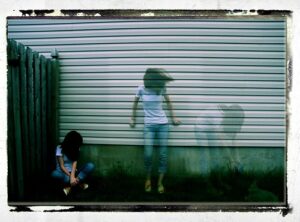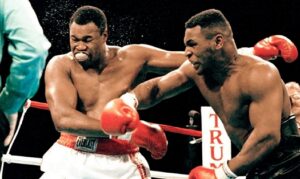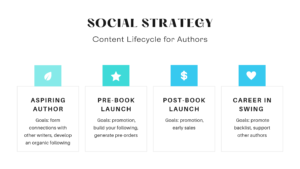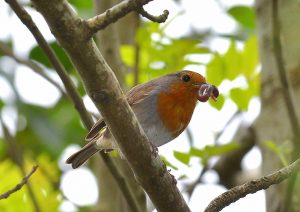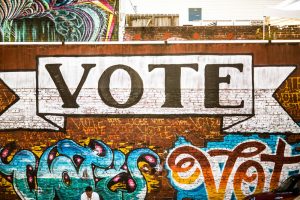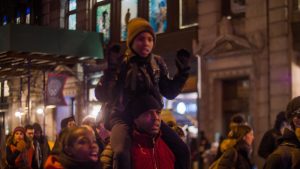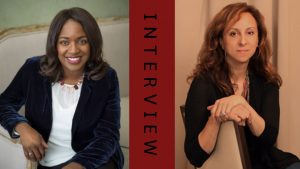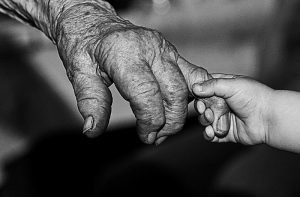Author in Progress
So we’ve got this whole “third-person narration” thing. You know it already. It’s that “he/she/they” thing instead of the “I/me/we” thing. The narrator isn’t the protagonist or (usually) any of the playing characters, and so the narrator is kind of floating above everybody’s heads, nonexistent, as lives are lived.
But the thing is, the third-person narrator isn’t floating. They’re not nonexistent. Not really. Rather, they envelope the book, hold it in their hands, and therefore are arguably one of the most crucial elements to your entire story. Just because nobody can see them doesn’t mean they’re not important.
So what do we do with an invisible narrator?
First off, let’s clarify something. I use “invisible” here meaning they’re right there on every page, yet we never see them. They filter every word they tell us, yet we forget they exist. They control everything we see, yet we know nothing about them. The invisible narrator is wonderful, full of voice, and surprisingly dangerous; someone wielding all the power without the reader even realizing it—not unlike subliminal messaging.
Working well with your narrator is how we get things like a particularly voice-y story or an unreliable narrator. These things tend to be easier to spot, however, when the narrator is also the protagonist. As in, first person. But when it’s third person, suddenly a particular viewpoint can be presented as—and believed as—a universal truth.
When it comes to your narrator, the reader often knows nothing about them and never will. But you do. And that’s our important bit for the day. You, as the author, need to make sure you know who your narrator is and what they’re up to.
While you may already be familiar with the general differences between first-person and third-person narration, you may be surprised to find that the third-person narrator does not default to you as the author. This is a common misunderstanding. While first-person narration usually involves two entitles to tell the story (the protagonist and the author), third-person narration usually involves three (the author, the narrator, and the protagonist).
Here’s the little image I made for my classes to help illustrate this point:
Read MoreCredit: Jens Johnsson
I thought it would get easier. I thought, at some point in my career I wouldn’t struggle so much with the same darn thing. But I was wrong.
Yes, I learn new tricks, new skills, new degrees of mastery with every manuscript. But without fail, every time, right around the half-way mark, I want to break down and cry. I can’t go any further. Like, it’s physically uncomfortable for me.
It’s the same visceral feeling I get at a large party, when the volume is going up, up, up, and all I want to do is find the nearest restroom and decompress from all the people. Or maybe just go home. And I’ve been thinking a lot about why that is.
Read MoreOver the past decade (whoa – has it really been that long?!?) at Writer Unboxed, I’ve endeavored to share a diverse range of insights: from Shakespeare to South Park; from Gatsby to Gilligan. What can I say? It’s all part of the service you’ve come to expect from the cavernous artistic depths of a guy like me. So today I thought it was time to explore what some might consider an unlikely source of literary inspiration: Mike Tyson.
No, this will not be a treatise on the aesthetics of facial tattooing, nor a tutorial on hitting things with approximately the same force as a disgruntled rhinoceros. Instead, I want to focus on an oft quoted piece of wisdom from Mr. Tyson, variations of which can be found all over the interwebby zeitgeist:
“Everyone has a plan until they get punched in the face.”
True confessions: I’ve been punched in the face. More than once. (I know, I know – given my utterly radiant personality, this must come as quite the shock to many of you.) I can tell you this: Mr. Tyson is not wrong. What looks like rollicking good fun in westerns and action movies is actually FAR more jarring and traumatic than one might assume.
Obviously I’m not alone in knowing this. Once you reach a certain age, it’s far more likely that you’ve been punched in the face, either figuratively or literally. Eventually we all experience the face-punching trauma of loss, physical injury, failure, grief, serious illness, or any number of similarly unpleasant variations. I think the point Tyson is trying to make is that when that punch comes, it can change everything.
From boy to man
I became a man in Orlando, Florida on the night of March 14, 1983. That’s the night I learned that my father had died, a piece of news that played out over an excruciating series of phone calls from the Illinois hospital where his condition had suddenly plummeted. As it was too late in the evening to book a flight out of Florida, I was stuck waiting by the phone for each new update until the final inevitable call came from my newly widowed mother.
At 23 years of age, I was technically already a man, but I sure didn’t feel like one. I was just a young guy living on his own in Florida, a thousand miles away from his loved ones, doggedly trying to eke out a living as a professional drummer.
My father, on the other hand, was definitely a man. A combat veteran of WWII and a street-hardened journalist who’d worked on newspapers across the country, he was every bit the old-school stand-up guy, with a pockmarked face and a nicotine-burnished voice. I loved and admired the man deeply, although neither of us was very good at expressing that kind of sentiment, and we’d reached a point where we had little in common – or so I felt at the time.
His death had a massive and lasting impact on me, and felt like an urgent and undeniable call to step up my game and start thinking and acting like a man – whatever the hell that might mean. As I grappled with the notion of him being gone, a distant memory of […]
Read MoreFor many authors, generating social media content ideas is a necessary evil: we all know the importance of keeping up a platform so we can engage with readers and the book community, but maintaining social platforms is yet another to-do item on an already long list.
I’m here for you, friends.
Below are 100 social media content ideas for every stage of your writing career. There are 25 items listed for each of the four stages. Whether you’re an aspiring author, have an impending book launch, just launched a book, or your career is in-swing, I hope you’ll find the below ideas useful.
The content suggestions listed are best-suited to three platforms in particular: Instagram, Facebook, and Twitter. That said, these ideas could also be used in your author newsletter, on YouTube or TikTok channels, etc. We all have a favorite platform (mine is Instagram) but no need to recreate the wheel: once you’ve created a piece of content, use it widely across platforms (and reuse down the road, if applicable!)
Let’s get right to it.
Career stage: Aspiring Author
Content goals: Form connections with other writers, develop an organic following
Content ideas for the aspiring author include:
Read More
Flickr:brianjobson
We’re so pleased to announce Liza Nash Taylor as a regular WU contributor! You may remember Liza from her guest post, On Being a Debut Novelist at Sixty. From her bio:
Liza was a 2018 Hawthornden International Fellow and received an MFA from Vermont College of Fine Arts the same year. Her work has appeared in Gargoyle Magazine; Deep South, and others. Her debut novel, ETIQUETTE FOR RUNAWAYS (Blackstone Publishing, 2020) is listed in Parade Magazine’s 30 Best Beach Reads of 2020 and Frolic’s 20 Best Books of Summer 2020. Her second novel, IN ALL GOOD FAITH, will be published in August.
We love this first official post from Liza, which takes the long view of her journey and highlights the importance of perseverance (WU’s Official Favorite Word!). Welcome, Liza!
—
Adapted from a series of blog posts on one writer’s path to becoming a late-blooming novelist.
It’s late February in Virginia, and freezing rain has been falling on and off for several days. This morning, the birds huddle in and beneath the boxwood bushes near the feeders, feathers puffed, waiting it out. The openings in the feeder tubes are clogged with ice, and loose seed in the trays has frozen. A lone dove basks in the steam of the heated birdbath, but for the most part, today is not a good day to be a bird. I wonder, do they think of spring? Of plump larvae and juicy worms ahead? Getting published, I’ve learned, is like waiting for worms. Waiting being the key word here.
Seven years ago, I was in my early fifties and a fledgling writer. Having embraced a new passion I was taking every writing class I could find and I had “finished” (ha! Finished! [snort]) my first historical novel manuscript. I wanted to see where this writing thing would go.
I wanted to soar, but first I needed to hatch.
In an attempt to make up for lost time I applied to a semester-long course through Queens University in Charlotte, called One Book. I was fortunate to be paired with an experienced New York editor from a major publishing house. She read seventy-five pages of my manuscript before our first workshop. After friendly introductions among our group, she said, “Now then. We’re going to start with Liza’s submission, because we can cover a LOT of ground here.” My antennae went up. She went on the elucidate, “…because a lot of these mistakes will apply to everyone’s work.”
I wanted to lock myself in the bathroom and sob. But no, after my work was chuckled over, mocked, and dissected by said editor, our group had to go out to lunch together. Over salads, I looked across the table at the woman who had just flayed my submission and I said, “Wow. I feel like I’ve just been on an intervention on What Not To Wear.” She smiled.
This was my first exposure to eviscerating criticism of my writing. I deserved it. I needed it. I was crushed, then defensive, then humbled/weepy/tremulous, and finally, determined to do better, dammit. It had been a long time since I’d felt this sort of life-changing inspiration and a long time since […]
Read MoreI should not be writing this post right now.
I should be working on my second novel, which is due to my editor, in three days.
I should be promoting my first book, which just launched three weeks ago.
I should be doing laundry or cleaning the bathroom.
Is my son due for a Covid test tomorrow? Wait, where are my kids? Did anyone feed the dogs today?
I should not be writing this post right now.
I will look back on January 2021 with a lot of emotions. My debut novel, Waiting for the Night Song was released on Jan 12, marking the achievement of a dream thirteen years in the making. I didn’t have the in-person launch party I had always envisioned, but my virtual launch was incredible. Friends, family, and strangers from around the world tuned in – including my middle school science and English teachers. I had cake, flowers, and an outpouring of love that I will treasure forever. It was perfect.
At least that’s what you saw if you followed my social media posts: love, joy, pride, celebration.
What you didn’t see was that my second novel, The Last Beekeeper, is hanging over my head, so I’m trying to juggle celebrating the first book while madly revising the second book for a deadline I’ve already pushed back twice. For every celebratory post I write, there is a stress bomb hovering over my shoulder.
You might remember a few other things that happened in January 2021. The pandemic reached its most deadly point, domestic terrorists attacked our nation’s capital, we inaugurated a new president under tenuous circumstances, and we initiated a historic second impeachment of a former president – all of which make my book launch feel a bit inconsequential.
Oh, and I have four kids, three of whom have been home doing online school since March. Two of them moved out in mid-January – the same week as my book launch. As my launch day approached, the stress bomb got bigger.
Did I mention my husband had ankle reconstruction surgery in November and hadn’t been able to walk, even with crutches, until a couple of weeks ago?
I really should not be writing this post right now.
As I write this, I’m contemplating whether or not I have time to squeeze in a shower before a book event this evening. (My hair looks fine. No one will notice on Zoom will they?)
Before you all start overnighting me bottles of scotch to calm me down, I need you to understand something important: I’m fine.
I’m great, actually.
As the pandemic worsened and it became obvious that my book launch would take place under tightened lockdown and in the middle of political turmoil, I had an epiphany: This is my moment. This is my debut that I have worked toward for more than a decade.
I can give in to fear, stress, and anger, or I can rise up and claim the joy I’ve worked hard for.
I choose joy, dammit!
As I write this, it is snowing, that quiet, soft New England snow that makes you want to curl up with a book and a cup of tea. I have a fire roaring in my fireplace and, despite the deadline stress and the fact that I cannot […]
Read MorePublishing a book is the scariest, most exhilarating thing I’ve ever done. It’s hard to believe that my debut novel, The Kindest Lie, will enter the world in less than a month. One of the best parts of this journey has been sharing it with Julie Carrick Dalton and Sarah Penner, writers who are also debuting this year. Three different publishing imprints. Three very different books. Yet one shared obsession when we meet every Sunday afternoon on Zoom: Will my book be successful? Have I done enough to give my novel the best shot at success? What is success?
I turned to a few authors I admire (many who debuted in 2020) to hear what they’ve learned along the way. These writers, like most, were incredibly generous with their wisdom. Whether you have a book coming out this year or someday (and you will), save these nuggets of insight and pull them out when you need them.
What I wish I had known…
“I wish I’d known how overwhelming marketing and promotion can be, immediately after your book is released. Readings, panel discussions, interviews, book clubs, social media posts—all of these take up an amazing amount of time, and it’s important to keep your writing going. So, the best piece of advice I can give is to set aside at least an hour a day to devote to your next project. You won’t be sorry!”
-David Heska Wanbli Weiden, author of Winter Counts
“I had such a great debut year and learned so much as a result. What I wish I’d known going into my debut year is to not be ashamed to ask for help. As Black women, we’re so used to carrying everything on our shoulders. This mind frame bleeds into everything we do. With publishing, you have a whole team behind you with years of experience in navigating the difficult terrain of editing, marketing, publicity, etc. That doesn’t mean you won’t have an opportunity to educate them on how to improve upon this in our evolving landscape between publishing and social justice; it does mean you can use their assistance to grow your platform and give voice to you and your art.”
-Catherine Adel West, author of Saving Ruby King
“As a decades-long career coach to lawyers, I pretty much “coached” the heck out of myself as my debut month approached. But the one thing that most surprised me was how quickly the satisfaction, for me, of a good review dissipated compared to the malingering of a bad one. For every author affected by bad reviews, there is one for whom negative criticism remains instructive and constructive. Sadly, I am not that author! So, having a handle on how criticism would resonate with me, and how to handle or even avoid it, was one thing I wish I’d known.”
-Natalie Jenner, international bestselling author of The Jane Austen Society
“I wish I had known how kind, generous and compassionate readers are. I have received many letters since the publication of The Mountains Sing and I count them among my precious gifts. I also wish I had known how busy the year could be. I have done more than 100 virtual events during the last nine months since my novel’s […]
Read MoreI’ve been thinking a lot about storytelling and how stories wire and rewire our brains. The way facts can obscure the truth. The way a tiny whisper can overpower a scream.
How a story is told alters the truth that emerges from the narrative. Stories can drive us apart from each other, and they can illuminate our common humanity. Stories teach us new perspectives.
As a fiction writer, I am not necessarily bound by facts. I do, however, feel beholden to truth. But as we stand here together on the rubble of 2020, how do we even discern what truth is?
This election season has been an exercise in truth-telling and truth-denying. It has been a colossal experiment in story. No longer do voters simply ask, Which facts do I believe? They ask Which story resonates with me? Which narrative do I choose to believe?
We all know that data can be manipulated. Facts and figures can be selectively pieced together to convey a predetermined message. Polls can be wrong. So, so wrong. When I look back on the 2020 election, I will not remember the voter turnout in Florida or the number of mail-in ballots from Michigan.
I will remember the picture of a young girl being torn away from her parents by border control agents. I will remember the faces of George Floyd and Breonna Taylor. I will remember the devastation of historic forest fires and record-breaking hurricanes that crashed into Gulf Coast communities. I will remember the captivating eyes of Selena Reyes-Hernandez, one of the many transgender people murdered in our country this year. I will remember the refrigeration trucks filled with victims of COVID-19 lined up outside New York City hospitals.
These are the stories, the truths that moved me in 2020.
But another version of 2020 also exists. This other version includes brave militias valiantly defending Confederate statues, unmasked customers asserting their ‘right’ to shop mask-free, proud sports fans clinging to culturally appropriated team mascots while ignoring the Indigenous people they disrespect.
One America. Two stories.
The problem is that most of us live in echo chambers and hear the same plotlines parroted back to us from our like-minded friends and insular social media circles. We tune in to the news we agree with, unfriend the people whose narratives deviate from ours.
Our truth becomes the only truth.
Fiction, however, is a stealthy device, a Trojan horse that sneaks different perspectives in unnoticed. Story presents an opportunity to share the truths we believe in with people outside our bubbles.
Read MoreOn Election Day in 2008, my father was bedridden, his body ravaged by lung cancer. Luckily, I’d convinced him to vote early, and less than three weeks later, he was gone. Herman Hugh Johnson, a man who lived through the Great Depression, World War II, and Jim Crow, cast the last vote of his life for America’s first Black president.
I believe those of us whose ancestors have been denied the right to vote have a profound respect for its power. My debut novel, The Kindest Lie, opens with an election night watch party for Obama, and I tell the story of the promise and limits of hope during that era. As an author, I’ve struggled with how public to be about my own political activism. Who am I to speak out about politics? Will I alienate readers? What I’ve come to realize is that as a Black woman in America, my very existence is political. The stakes are too high for me to remain silent, so I’ll continue to use my voice as an author to encourage civic engagement and fight for freedom and justice.
That’s my story, but I wanted to hear from other authors. So, I asked them why they’ve chosen to be politically vocal and public about it. Here’s what they told me:
“I talk to my (social media) followers about the election as if we were sitting in a room having a conversation. I like to know what people are thinking, and I like to be heard.” – Maurice Carlos Ruffin, author of We Cast A Shadow
“I am a writer. It is something I’ve always wanted to do. Always wanted to be. I want to sell books. Lots and lots of books. And spend my days thinking about the next book I want to write. But I am a mother. Of two Black sons. The wife of a Black man. The grandmother to a tiny Black girl. This country has never GIVEN us anything. We have had to demand it, take it, die for it. The last four years have shown just how fragile these gains are, how easily taken away. If I can’t breathe the air, drink the water, have access to health care, marry who I love, make my own reproductive choices, or even be assured that my sons will come home at night, then having a bestseller is pointless. I DO care about book sales and alienating readers, but not as much as I care about living in a safe, clean, moral country.” – Rita Woods, author of Remembrance
Read MoreI’m sitting at my computer, but my fingers have lost their rhythm. They’re rigid. Mechanical. Impotent. It’s as if they know or have been here before and recognize the shackles that bound my Black ancestors are the same ones we wear today.
History lacks originality, always emerging in new skin encasing the same old terror.
I’m a writer and I’m supposed to bring eloquence to our coarse dialogue, a balm to our pain, beauty to our ashes. But there’s nothing new to say, nothing but what’s been said before and will be said again.
The world knows Kenosha, Wisconsin now, and news anchors nationwide stumble over its pronunciation. I grew up not too far away in Chicago, and my first job as a television news reporter was with a small, independent station in Kenosha. The town fell silent about six years before I moved there when the Chrysler plant closed, and thousands of jobs disappeared. I remember the gaping hole of despair in that community with an empty assembly plant sitting in the heart of town, its hum silenced.
I also distinctly remember one photographer at my station who greeted me loudly every time I entered the newsroom: “Here comes Nancy, there goes the neighborhood.” Attempting to sweeten his venom, he often chased his insult with a chuckle. Decades later, in that same town, seven state-sanctioned bullets pierced the back of Jacob Blake and I can’t say I’m surprised about the devaluing of Black life. It’s in the DNA of Kenosha and every other corner of America.
I’m formally and professionally trained as a writer, but my real education comes from living in a Black body. That daily reality informs what I write, how I write, and why I write.
In my fiction, Black bodies tense in police encounters and face oppressive systems. Yet those same bodies allow muscle memory to transport them to the hand-clapping games and double-dutch rope of their youth. They slam their cards and trash talk at the Spades table. They live. They’re more than their pain. And I’m uniquely suited to bring them to life on the page.
I want my writing to be a guiding light of education and understanding, a bridge connecting Black and brown people with our white neighbors. Writing can be a lofty, altruistic endeavor, but it can also be hazardous. Living while Black and then writing about it can be injurious. Truth-telling costs. The emotional labor of justifying my outrage and explaining my humanity is exhausting.
The importance of this work complicates everything. People say this is the largest multiracial movement for change ever in the history of America. After a string of deaths of unarmed Black people this year, white folks began reading about the Black experience in this country. That is a good thing. Yet for the Black writer, there’s a price to pay even for that good thing.
Read MoreI’ve been bouncing in my chair like an impatient toddler waiting for the release of Australian author Charlotte McConaghy’s US debut, Migrations (Flatiron, Aug 2020.) In addition to being an immersive, satisfying read, Migrations offers a case study in setting, pacing, and character development.
Migrations follows the emotional journey of a young woman named Franny who hitches a ride on one of the world’s last fishing vessels to track the final migration of the Arctic tern before the bird goes extinct like most other animals on this future Earth. McConaghy doles out clues to Franny’s past at a brilliant and well-controlled pace that kept me rapt until the last page. She even gifted me with a measure of hope for our shared future on this planet.
Julie Carrick Dalton: Charlotte, welcome to The Writer Unboxed, and congratulations on the launch of Migrations. Your opening lines took my breath away. “The animals are dying. Soon we will be alone.” I found myself weeping at several passages, mourning creatures we have not yet lost. What emotion do you hope to evoke by matter-of-factly dropping readers into such a stark—yet likely—future?
Charlotte McConaghy: I’m so sorry for making you cry! While it wasn’t my intention to depress readers, I do think it’s necessary to confront this potential reality or else we have no chance of avoiding it. It’s too easy to bury our heads in the sand and pretend none of this is happening, and I wanted to maybe startle readers out of this complacency. I think by facing the truth of this environmental crisis, and looking at what it will feel like to lose our animals, we can accept that things need to change, and that we need to be the ones to change them.
JCD: In Migrations, your main character Franny is chasing Arctic terns on their final migration before facing extinction. What about this specific bird captured your imagination?
CM: When I learned that the Arctic tern was the bird with the longest migration of any animal – from the Arctic to the Antarctic and back again within a year – I fell in love with it. In their lifespans, they will fly the equivalent distance of to the moon and back three times, and that feat blew me away, especially given that each year the journey for them becomes harder due to human impact on the environment. So the terns became a metaphor for courage, the courage Franny would need to undertake her journey, and the courage we will need in order to face this catastrophe.
Read MoreThe first half of this year has been a monumental test in flexibility and resilience for authors and everyone in publishing. My debut novel, The Kindest Lie, will release on February 9, and that publishing date has changed several times as the William Morrow team attempted to position my book and others in their catalog for optimal success during these uncertain times.
Recently, I joined the team of A Mighty Blaze, a new organization that formed to help authors and books find their readers during this global pandemic. That’s how I met Laura Rossi who leads publicity for A Mighty Blaze. She worked in-house at top publishers, including Random House, Viking Penguin, and W.W. Norton before founding Laura Rossi Public Relations.
Laura was incredibly generous sharing with me nuggets of wisdom about promoting books during a pandemic, buying the right equipment for all the Zooming and Skyping, making publishing more diverse and inclusive, as well as pulling back the curtain on how some books get on those elusive, coveted “most anticipated” lists. I’ve edited our interview for brevity, but it was seriously so good that I wish all of you could’ve been on the phone with us.
Nancy Johnson: How has the pandemic impacted our ability to get our books out there into the world?
Laura Rossi: The first thing that happened to many books is their publication dates changed. That was a huge pivot for lots of authors, seeing their early summer pub dates move to fall or in some cases 2021. Summers work well for commercial fiction and beach reads, but it’s often not the best time for bigger books. That was a big trend I noticed. Authors had to give up control and let their publishers do what they thought was best in a very different world. Some books published and didn’t live up to expectations the authors had. Lots of books with March, April and May pub dates—copies were already printed and warehouses were still able to mail books—pubbed during a pandemic. But before May there wasn’t a lot of space for book coverage and some of those books that weren’t able to move didn’t get a lot of media or sales. However, if your book came out in hardcover during the pandemic, you still have a shot at pushing that paperback a year or more later. That second chance is encouraging.
NJ: How has publishing had to adjust now that we don’t have hand-sales in bookstores and in-person author events?
LR: All real-life events were paused or canceled, and many went online. Conferences, workshops, big in-person events like BookExpo and the intimate author lunch with someone from a magazine went away. Those schmoozing opportunities to hand-sell your book were gone. Some authors in the past would get pre-sales visits to New York to meet with booksellers. That personal touch has had to go virtual. People are not going on tours visiting 25 bookstores anymore.
NJ: This all sounds terrible. What do you tell your authors about how to pivot in this new environment?
Read MoreI wish we had a long German word for the feeling of being surprised by a plot twist in a way that both satisfies and moves a reader. I need a way to describe the genius of a revelation that enhances all that came before it, but without making the reader feel foolish or deceived. A word that implies added layers of meaning the plot twist lends to existing elements of a story and characters.
The word must also suggest a contract that the twist will impart something meaningful the reader didn’t even know they were seeking. If the twist doesn’t satisfy, if it doesn’t make the reader rethink the book or maybe even their own beliefs, then it’s just a cheap trick.
We have come to expect twisty secrets, particularly in the suspense genre. We stand ready, always on the lookout for a clever surprise in books, TV shows, and movies. I don’t mean to be coy in this post, but I’m a big believer in not giving away surprises, so you won’t find any spoilers here, even when I allude to some well-known stories. I am committed to preserving the sanctity of the plot twist.
I remember exactly where I was, sitting on a creaky movie theater seat next to my cousins the day after Thanksgiving when I watched M. Night Shyalaman’s The Sixth Sense for the first time. The entire audience gasped at the same moment of that famous plot twist. My mind spun backward, trying to find a flaw in the meticulous plot construction. But, no, all the information was there, tightly assembled to distract me from seeing what was right in front of me – but without deceiving or tricking me.
A plot twist, just for the sake of a collective gasp would be nothing but a hollow, air-filled noise. If I had gone back to reflect on The Sixth Sense and not found the bread crumbs, I would have been angry. Instead, I was awestruck.
I had a similar experience when I saw Jordan Peele’s Get Out, in which a Black man is invited to his white girlfriend’s family’s home. We know right away something is off, really off, in the way the family treats him. But we don’t understand exactly what is going on. The twist here is bold and worthy of more than a gasp. There’s a lot to unpack, and it certainly made me reevaluate the expectations I held in the beginning and why I held them.
The unexpected twists in The Sixth Sense and Get Out stayed with me because, for different reasons, they moved and challenged me.
In contrast, television viewers of a certain age will remember the outcry when a much-anticipated episode of the TV show Dallas revealed the entire previous season had all been a dream. All those Who Shot JR? T-shirts, all that build-up for nothing. Yes, viewers were surprised, but they also felt duped. There’s nothing satisfying in feeling manipulated or tricked.
As a novelist, I hope to find that sweet spot that catches readers off guard, but in a way that feels organic to the story and characters. I don’t need to shock them, but I want readers to walk away […]
Read MoreThe world has a way of shaping our literature, bending our writing to align with the arc of history. I began writing The Kindest Lie, my debut novel, in earnest during President Obama’s second term in office, a time when Americans were grappling with the promise and limits of hope. The racial and socioeconomic chasm of that period influenced my narrative and provided the cultural milieu for the book.
Soon, we’ll all emerge from this international health crisis into a new world order, a new normal defined by this global pandemic. I’m in brainstorm mode for book two, and I can’t help but think of how the times we are living in will inevitably change me and my approach to fiction. In these Darwinian days when we fear for our health and know that basic necessities like toilet paper are scarce, it becomes difficult to trust others. I predict that the issue of trust will appear consciously or unconsciously in our writing.
I’m wary everywhere I go now, my eyes narrowed and judging above my tight-fitting mask. Last week, I stood in the condiment aisle of the grocery store and glanced furtively at an unmasked man approaching with his shopping cart. Instinctively, I pivoted and leaned into the shelves of ketchup hoping he’d pass quickly without breathing on me. Unlike a presidential era that can on a good day be viewed as an academic exercise, what we’re living through now is an inescapable, seismic shift in our way of life. It will change us as people and it will change our fiction, too.
It won’t be as simple as modifying the fashion choices of our characters in contemporary stories by adding masks and gloves as accessories. Many of us are under stay-at-home orders and will cycle through quarantines for months and possibly years to come. As people, we crave human touch and for prolonged periods we will be starved of it. I wonder how isolation will manifest in our fiction and how deprivation will drive story. Maybe we’ll translate aloneness and loneliness in new ways on the page. But I also imagine we’ll think more creatively about connection after watching quarantined people in Italy sing their national anthem from balconies.
I like to think that I write books in a dream state, but now COVID-19 clouds my actual nighttime dreams. In a recent dream I lived on a college campus in a dorm where a classmate said something hurtful because of misinformation. I had misjudged him, too. We both realized our mistakes in this one charged moment and stood facing each other awkwardly, taking halting steps toward one another. Just as we were inches away from a forgiving embrace, we jumped back, suddenly aware that we were about to engage in the most harmful behavior: hugging. That fear will find its way into my writing and the psyche of my characters, I’m sure.
I don’t write romance, but this virus will change the love story, or at least the meet-cute part. In the past, a realistic plot might have involved two people asking to see each other’s HIV status as proof they were “safe.” Now there’s a new layer of criteria for safety that could include a rapid test for COVID-19 and […]
Read More
